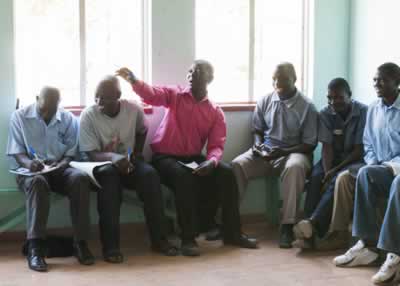
The Sunday News

 Twayimukila Kapenta Co-operative secretary Mr Gaisan Msaka (third from left) sharing his point of view at a meeting between the fishermen and stakeholders in Binga
Twayimukila Kapenta Co-operative secretary Mr Gaisan Msaka (third from left) sharing his point of view at a meeting between the fishermen and stakeholders in BingaFISH farmers in Binga are up in arms with the licensing authorities for charging the highest fishing permit fees in the region, pegged at $2 000 per year, a figure almost five times more than what other regional countries charge.
In an interview with Sunday Business in Binga last week on the sidelines of a meeting between the fishing players and stakeholders, the fishermen said they were not happy with the high permit fees.
Chunga Fishing Co-operative Society chairperson Mr Kenias Chigwagwa said they were being charged more although fishermen using the same Zambezi in other countries were being charged less.
“In Zambia they charge $400 per year and in Mozambique, permit fees are pegged at $600 per year but in Zimbabwe the Zimbabwe Parks and Wildlife Management Authority charge us $2 000 per year for fishing in the same river the Zambians are fishing,” said Mr Chigwagwa, adding that the fees were making their business unsustainable.
He said in Binga the situation was even worse as the Binga Rural District Council was also charging vendor’s licence.
“In Binga, the National Parks charges $20 vendor’s licence while the BRDC charges $15. In Nyaminyami, Kariba, they only charge $20 and the National Parks does not charge. So most of customers are no longer coming here in Binga but to Kariba where vendor’s licence is not charged,” he said.
Mr Chigwagwa said their pleas to have operational costs improved had fallen on deaf ears. He said high operational charges had seen most businesses failing to break even.
“We are forced to raise our price in order to cushion ourselves against the expenses that we incur. The challenge now is that there is an influx of the kapenta fish from Mozambique and Zambia that are coming at very low prices,” he said
The cheap kapenta from Mozambique and Zambia is selling at about $120 for a 30 kilogramme bag while the locally produced is selling at about $150.
Mr Chigwagwa said instead of the authorities assisting them in running their business, they were pulling them down.
“We don’t have the resources for our business like nets, boats and fishing rigs. The National Parks is not giving us any assistance but just milking us. Some time ago, we engaged the then Minister of Environment Cde Francis Nhema and the fees were reduced to $2 000 from $2 500 but still they are too high,” said Mr Chigwagwa.
Twayimukila Kapenta co-operative secretary Mr Gaisan Msaka, said the high operational costs were destroying the local fishing industry.
“If the fees are not reduced, this industry might collapse.”
The fishermen said the situation was also being compounded by high operational costs incurred – taxes to the Zimbabwe Revenue Authority and health inspectors.
The meeting between the fishermen and authorities was organised by a local non-governmental organisation Zambezi Valley Local Rights Project.
During the meeting, Ministry of Small to Medium Enterprises and Co-operative Development district co-ordinator Mr Simbarashe Mangisi told the fishermen to keep on engaging the relevant stakeholders until they find a solution.
The Zambezi Valley Local Rights project officer Mr Gayson Siampongo said it was high time line ministries and the traders found common ground.
“It’s best that the Government and the fishermen resolve this challenge,” said Mr Siampongo.
He also urged the fishermen to make follow ups on their grievances.
Mr Siampongo said his organisation was there to capacitate the fisherman so that they were able to run their business profitably.
Buumi-Bwesu Fishing co-operative chairperson Mr Philemon Mutale said despite the challenges in their line of business, they were managing to raise money to support their families. Zimbabwe Parks and Wildlife Management Authority spokesperson Ms Caroline Washaya Moyo said they were not getting Government funds to run their activities hence depended on the permit fees.
“Zimbabwe Parks and Wildlife Management Authority has no fiscal support from Government for conservation practices. Further Zimbabwe has aggressive monitoring and law enforcement on the Lake which needs to be funded. All proceeds from permit fees are ploughed back into conservation, research, staff costs and recapitalisation efforts on the Lake,” said Ms Washaya.
She defended the high penalties and said they were meant to curb poaching.
“Penalties by nature are meant to be deterrent to poaching which is threatening the very resource in question. Zimbabwe has declared zero tolerance to poaching and will punish severely perpetrators of such acts,” said the official.



